The Role of Human Capital and Regional Effects on Earnings: Multilevel Mixed Effect Regression Approach
DOI:
https://doi.org/10.23917/jep.v24i2.23123Keywords:
Labor earnings, human capital, demographic factors, regional effectsAbstract
Indonesia has an abundant labor supply, so examining the determinants of earnings that reflect labor productivity is essential. This study is keen to estimate the effect of human capital, demographic factors, and regional (Regency/City) effects on workers’ earnings in the Province of Central Java in 2022. The data is collected from the National Labor Force Survey (Sakernas). The multilevel mixedeffect regression is employed to assess the effect of individual characteristics and district-level variation on earnings. The study found that human capital, demographic factors, and regional (Regency/City) effects significantly affect earnings. Education and training are essential to improve workers’ skills, leading to higher performance. Further, regional characteristics have contributed to explaining earnings variation across workers in Central Java.
Downloads
















